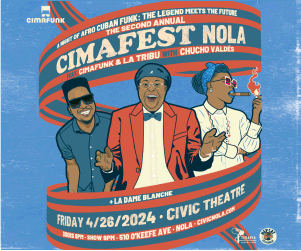Conversational, Eclectic & Whimsical
Two years after their debut CD, Dogs, and with a cross-country tour under their belts, Nolatet is back with a recording that expands on its super-improvisation concept. For the first project, vibes player Mike Dillon, pianist Brian Haas, bassist James Singleton and drummer Johnny Vidacovich stuck to their primary instruments. The band’s expanded sound palette for No Revenge Necessary is substantial. Dillon added marimba, tabla and percussion; Haas added melodica; Singleton added pocket trumpet and bass melodica; and Vidacovich added timpani to their respective instrumentation. The result is music that is conversational, eclectic, sometimes whimsical—and always intriguing. Here, they explore the New Orleans music tradition in a funky jam band style with many more sonic options in their hands.
This recording is rich in the players’/writers’ vision and delivery. Haas wrote the opener, “Lanky, Stanky Maestro,” as a tip of the hat to Vidacovich, one of the Crescent City’s most enduring and versatile drummers, and frequent rhythm-section teammate with Singleton since the 1970s. Vidacovich turns it into a frisky musical conversation with each of the other players. Dillon’s vibes and marimba provide a surreal counterpoint throughout Haas’ often-frenetic “Homer and Debbie.” Singleton’s “Black Sheep” features his pocket trumpet, cushioned by Dillon’s marimba and Haas’ whimsical “Baa Baa Black Sheep” keyboard responses.
Haas composed the plodding title track about the end of a relationship, but also sees it as a musical commentary on today’s divisive times. Each player contributes mightily here, buoyed by Vidacovich’s deep-timbred timpani. Dillon’s sparkling vibes dominate his “Elegant Miss J,” offset by the drummer’s loping drum solo.
Singleton’s horn work is the clarion call on the CD’s most ambitious piece. His composition “Dikefinger” opens with the four players combining angry musical imagery about Hurricane Katrina before the mood dramatically shifts into an upbeat anthem about hope and unity. A very different mood dominates “Bluebelly,” the bassist’s zany response to the punkish modernism found in Dillon’s and Haas’ musical adventures with their other projects, including Garage A Trois and Dead Kenny G’s, and Jacob Fred Jazz Odyssey, respectively. It feels a bit out of control from start to finish, intentionally.
Haas was inspired by parts of America’s landscape when he composed the more reflective “Gracemont” (a town in Oklahoma’s Wichita Mountains region) and plodding “Pecos Wilderness” (near his home in Santa Fe). The closer, Singleton’s “Malabar,” is the most poignant track. His nimble bass work, Haas’ avant-garde keyboard runs and Dillon’s high-energy vibes offset the subdued ending, which features a bowed bass solo and rather mournful trumpet finale. You never know where these four are going—until they get there.
—Ken Franckling




